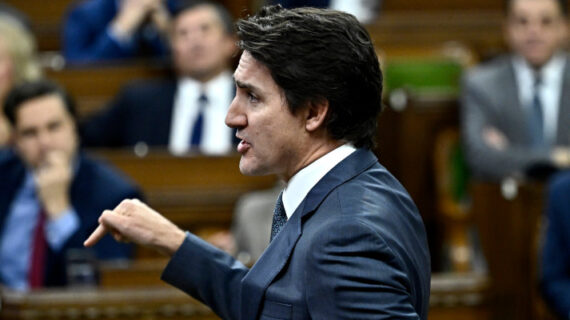CBC president and CEO Catherine Tait’s recent announcement that the public broadcaster intends to shift from traditional radio and television broadcasting to solely an online streaming service over the coming decade was made against a backdrop in which Conservative Party leader Pierre Poilievre’s high-profile commitment to “defund the CBC” has catalyzed a broader debate about the Canadian media landscape and the role of public policy to support news content and information in our society.
Hub contributor Steve Lafleur has weighed into this debate with a defence of the CBC in general and its role in filling a gap in the marketplace for local news in particular. Readers will find Lafleur’s line of argument worthwhile even if they ultimately disagree with him. They should.
The original case for the CBC as a public good dates back to the launch of radio communications and concerns on the part of the Conservative government of R.B. Bennett that the market wouldn’t provide radio services to small communities across the country. The basic argument was that these markets were too small to recoup a return on private investment and the risk was that they’d therefore go underserved or neglected altogether. The same thinking extended to television broadcasting roughly twenty years later.
The CBC has persisted ever since without much self-reflection about its original rationale. In the intervening years, the case has evolved from a basic market failure to amorphous arguments about elevating Canadian content and telling national stories. The size, scope, and public subsidies for the public broadcaster have nevertheless grown largely unabated.
Poilievre’s case for defunding the CBC has thus far tended to stay high level. The insinuation is that the CBC is unbalanced and tilts too far left which is broadly correct. A 2017 poll for instance found that respondents viewed the CBC as the most biased national media outlet in the country. But the principal case for getting rid of the CBC in 2023 isn’t merely about its perceived bias. It’s that it’s no longer needed. Ninety-year-old concerns about the market’s failure to deliver broad-based content, including Canadian news and information, have since been resolved by the positive-sum effects of the internet.
The case for reconceptualizing the CBC is the same as the one against the Trudeau government’s Bill C-11 which would extend the heavy-handed CanCon regime to online streaming services such as Netflix and YouTube. We no longer need to use the levers of public policy—including mandates, quotas, subsidies, and even state ownership—to ensure that Canadian content is produced and disseminated. There are plenty of successful Canadian content producers succeeding in today’s highly-competitive and highly-global online market. As I’ve written before, Canadian cultural producers and Canadian stories are reaching larger and broader audiences than they ever have.
Lafleur would probably agree with parts of this argument. He opposes the CBC competing with private broadcasters for scarce advertising dollars and makes a narrow case for its ongoing role similar to the original purpose of a public broadcaster in a large, sparsely populated country. He implicitly argues that while the CBC’s national scope may no longer be justified according to a clear definition of market failure, the market-driven decline in local news—particularly in smaller Canadian communities—justifies an ongoing role for the CBC.
This argument is more conceptually persuasive than a full-throated defence of the CBC. But in practice, it’s similarly lacking. The CBC isn’t really aiming to deliver meat-and-potato local news of the kind whose demise Lafleur laments.
His concession that “they [the CBC] may not have the budget to cover local issues in every town, but at very least they provide some level of news coverage where none might otherwise exist” fails to fully contend with the actual news coverage that the CBC tends to provide. Presumably because of organizational preferences and the self-selection of its journalists, so much of its local coverage today is highly-niche content that’s neither representative of the broad-based local experience nor particularly informative of important national or international developments for local audiences.
The problem lies with the CBC’s tendency to prefer micro over the meta. While it’s undoubtedly true that the news media has historically excluded marginalized voices, including racial and sexual minorities, the CBC’s solution to essentially put them at the centre of its understanding of local news, overreaches far too much in the other direction. Its legitimate efforts to rebalance who tells the stories and whose stories are told has devolved into a caricature of identity politics.
This point is worth underscoring: the ideological and partisan bias that Poilievre and other Conservatives raise at the national level might be tolerable if the CBC’s local news coverage was mostly about town council meetings, local sporting events, and other civic developments, but it’s most definitely not. It instead feels like a version of the news curated by a boring and predictable left-wing undergraduate student group. One only needs to listen to or watch a local CBC affiliate for a half hour to realize how narrow and unrepresentative its conception of Canada’s community life is.

The upshot: the future of the CBC and the problem of so-called “news deserts” ought to be seen as two separate and mostly unrelated policy questions. Defunding the CBC as Poilievre has promised is, by and large, justified according to the market and technological developments that have occurred since its original creation. How that is ultimately carried out involves a spectrum of policy outcomes as Stuart Thomson recently outlined for The Hub. Canadians should increasingly demand the Conservatives provide more details about their plan.
As for expanding public support for local news, Lafleur is right to raise concerns. Yet the policy response ought to be far more market-based and decentralized than merely throwing a $1 billion per year to a single public broadcaster.
One simple idea is that the government should expand access to its “registered journalism organizations” status. This would permit more news organizations to sit institutionally in a unique space somewhere between traditional for-profit models and charitable status. It would give them the scope to access new sources of funding, including philanthropic support, without being hamstrung by some of the editorial constraints faced by a traditional charity.
The government should also promote and expand public support for Canadians’ individual subscriptions. There are currently dozens of news media organizations for whom print or digital subscriptions can be eligible for a non-refundable tax credit. One option would be to make it refundable so that it essentially functions as a cash voucher to be used against subscriptions from Canadian-based sources. It would ensure the distribution of public dollars is democratized and therefore follows Canadians’ preferences rather than the diktats of bureaucrats and large tech firms.
An immediate step would be to follow Lafleur’s recommendation to bar the CBC from directly competing with private, for-profit news entities when it comes to the selling of advertising. It’s indefensible that successive governments have permitted the public broadcaster to undercut the revenue model of private news organizations which are risking shareholder capital to provide a public good in the form of local, regional, or national news and ultimately live or die on their advertising sales. It’s even more egregious that in recent years the CBC has gone well beyond traditional advertising to try and become a major player in the manipulative world of “branded content” where advertisers’ messages are seamlessly mixed into CBC on-air and online content. All this needs to stop. It’s lousy public policy and toxic for the CBC in terms of its journalistic reputation.
That’s a long way of saying, I suppose, that Lafleur (who we’re honoured to publish at The Hub) is right to raise concerns about the state of the modern media landscape but wrong to think the CBC is part of the solution. After more than 90 years, the public broadcaster has outlived its usefulness. It’s time to rethink its place in the Canadian media landscape, including possibly winding it down altogether. The future ought to lie in putting dollars in the hands of Canadians and letting them determine the country’s broadcasting future.




